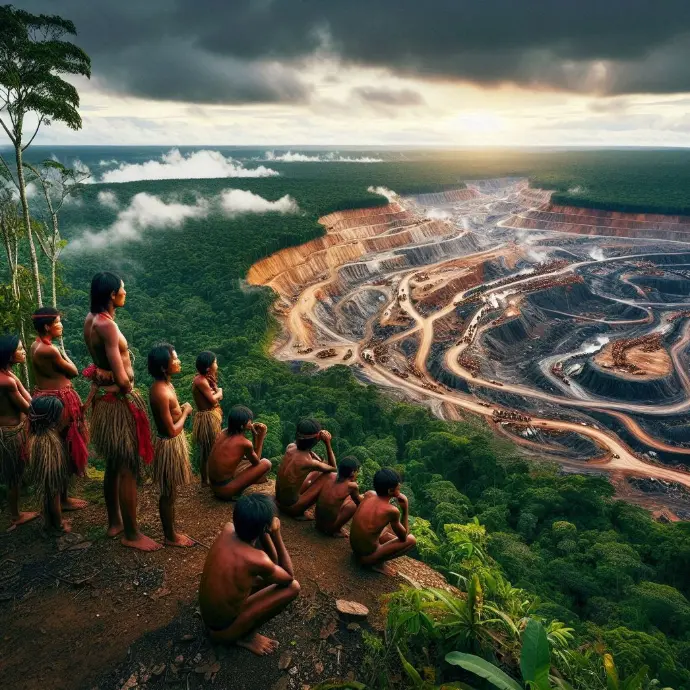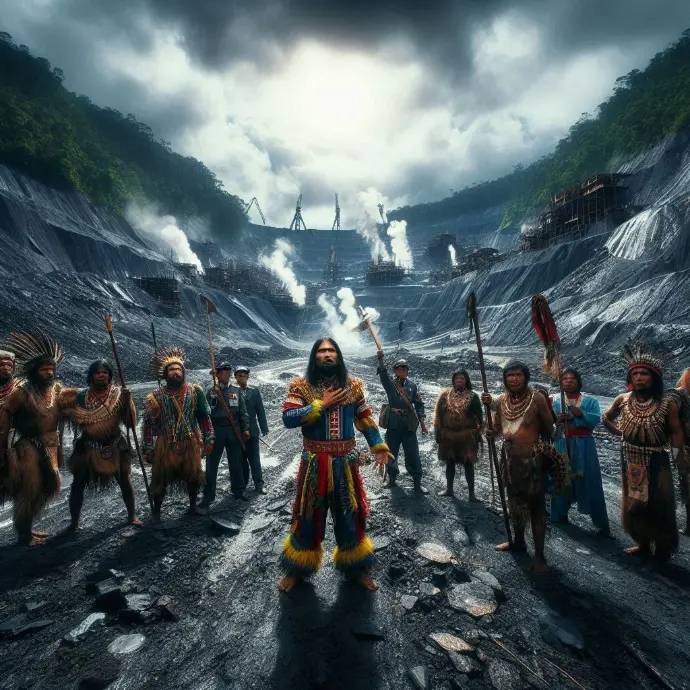



Devastated Territories: Mining and the Violation of the Rights of Indigenous Peoples
Welcome to our website, a space where the struggle for human rights is fully manifested. In the main article entitled "Devastated Territories: Mining and the Violation of the Rights of Indigenous Peoples," we address in detail the impact that mining activities have on the rights of these peoples. We invite you to immerse yourself in a thorough analysis that exposes the complex relationship between mining extraction and the fundamental rights of Indigenous communities. Continue reading to understand how these global problems affect the most vulnerable communities.
Introduction
Mining has had a profound effect on the rights of Indigenous peoples worldwide. These communities often inhabit areas rich in mineral resources, placing them at the epicenter of conflicts arising from their exploitation. Mining activities have caused devastation of the natural environment, water and soil pollution, and the loss of traditional lands, directly affecting their ways of life and cultural values. These projects are frequently carried out without the free, prior, and informed consent of Indigenous communities, thus violating their fundamental human rights.
The impact of mining on Indigenous peoples is a global issue. A comprehensive analysis of the social, environmental, and cultural impacts of these activities is essential to ensure full respect for the human rights of these communities.
It should be noted that mining compromises not only individual rights but also the collective rights of Indigenous communities, including the right to self-determination, access to their lands and territories, and the right to preserve and develop their cultural life.
Tensions between the mining industry and Indigenous Peoples are rooted in a complex historical context. For centuries, Indigenous communities have been subjected to the exploitation of their lands and resources by governments and mining companies. The emergence of mining activities in Indigenous territories has led to forced displacement, loss of cultural identity, and persistent social conflicts.
The historical process of colonization and domination has placed Indigenous communities in a position of vulnerability, with frequent violations of their rights by external actors seeking to exploit natural resources in their territories. This history shapes the approach with which Indigenous communities face contemporary challenges related to mining and the protection of their rights.
To adequately address violations of Indigenous Peoples' rights in the mining context, it is imperative to understand the underlying historical framework and promote actions that respect and ensure their human rights.
The protection of Indigenous Peoples' rights in the context of mining is supported by a range of international laws and conventions. The United Nations Declaration on the Rights of Indigenous Peoples recognizes and protects the rights of these communities, including the right to self-determination, the right to land, territory, and resources, and the right to be consulted and to give their free, prior, and informed consent on decisions that affect them.
Furthermore, International Labor Organization (ILO) Convention 169 establishes international standards for the respect of the rights of Indigenous and Tribal Peoples, including the right to be consulted on legislative or administrative measures that may directly affect them.
These legal and international frameworks provide a crucial basis for protecting Indigenous Peoples' rights in the face of mining, and it is critical that governments and companies respect and comply with these standards to ensure full respect for the human rights of these communities.
Violation of the Rights of Indigenous Peoples by Mining
The exploitation of natural resources in Indigenous territories is a highly relevant issue in the context of human rights. Mining companies often seek access to these resource-rich territories, which often leads to violations of the rights of Indigenous Peoples. The lack of free, prior, and informed consent and the imposition of mining projects without the consent of Indigenous communities are practices that violate their fundamental rights.
This exploitation of natural resources can also result in the destruction of sacred sites, landscape modification, and the forced displacement of communities, which represents a clear violation of Indigenous Peoples' rights.
It is important to note that, in many cases, the exploitation of natural resources in Indigenous territories is carried out without equitable benefits for local communities, further exacerbating the violation of their rights.
Mining in Indigenous territories has a significant environmental and social impact. Mineral extraction can cause water pollution, soil degradation, deforestation, and the generation of toxic waste, which directly affects the livelihoods of indigenous communities. Furthermore, this environmental impact can have long-term consequences for people's health and the preservation of their culture and traditional way of life.
At the social level, the presence of mining in indigenous territories can generate internal conflicts within communities, stemming from differences surrounding the acceptance or rejection of mining projects. Furthermore, the arrival of non-local workers can disrupt the social fabric of these communities and lead to discrimination and exclusion.
The impact of mining on indigenous communities is a matter of great concern, as it affects not only their natural environment but also their social and cultural well-being.
Conflicts between mining companies and indigenous peoples are frequent, and indigenous communities have shown staunch resistance to the imposition of mining projects on their territories. The struggle to defend their territorial, cultural, and environmental rights has led to mobilizations, protests, and legal claims by these peoples.
Indigenous peoples' resistance to mining not only seeks to protect their natural environment and ways of life, but also to demand respect for their autonomy, participation, and decision-making over their territories. In many cases, this resistance has succeeded in halting or modifying mining projects, demonstrating the importance of defending Indigenous peoples' rights in the context of mining.
It is essential to recognize the courage and determination of Indigenous peoples in their struggle to protect their rights against mining activities and to promote an inclusive and respectful dialogue that guarantees the full exercise of their fundamental rights.
Mining activity in Indigenous Peoples' territories has significant repercussions on their cultural identity and traditional ways of life. Many Indigenous communities maintain a close relationship with the land, considering it sacred and fundamental to their worldview. Mining can result in the destruction of sacred sites, alteration of the natural landscape, and contamination of water and soil, which directly impacts the cultural and spiritual practices of these peoples. Furthermore, the extraction of mineral resources often forces communities to displace their ancestral territories, leading to the loss of their traditional ways of life and the weakening of their identity as a people.
The imposition of mining projects on Indigenous territories can also lead to internal conflicts within communities, as some people may be tempted by the economic opportunities offered by the mining industry, while others strongly oppose the exploitation of the land due to their cultural beliefs and values. This situation can generate tensions and divisions within communities, further weakening their social cohesion and their ability to preserve their cultural identity and traditional ways of life.
Furthermore, mining can introduce consumption patterns and economies alien to Indigenous communities, leading to risks of economic dependency, loss of traditional knowledge, and displacement of sustainable practices. The disruption of traditional activities, such as subsistence farming and hunting, can have devastating impacts on the autonomy and identity of Indigenous Peoples, undermining their ability to maintain their livelihoods and cultural values.
Mining and Human Rights Violations
Mining has often been associated with human rights violations, especially with regard to Indigenous communities and the protection of their territories. The extraction of mineral resources has led to environmental destruction, water pollution, and the displacement of entire communities, violating their right to a healthy environment and adequate housing. Furthermore, the lack of prior and informed consultation with these communities violates their right to participate in decisions that directly affect them. This situation has generated conflicts and tensions that have led to human rights violations.
A thorough analysis of the social, environmental, and economic implications of mining activities is crucial to ensure that the human rights of all involved are respected and protected, especially Indigenous Peoples whose territories are directly impacted by mining.
The relationship between mining activity and human rights is a highly relevant issue today, as its impact goes beyond the merely environmental or economic, encompassing ethical and legal dimensions that must be addressed comprehensively.
Labor abuses and inadequate working conditions in the mining industry are a constant concern in many countries. Mining workers, the vast majority of whom come from marginalized communities, often face grueling workdays, exposure to toxic substances, a lack of adequate safety measures, and insufficient wages.
These precarious working conditions constitute a clear violation of the labor and human rights of mining workers, who deserve safe and decent conditions to perform their jobs. The lack of effective regulation and oversight by the competent authorities has perpetuated this situation, generating a cycle of vulnerability and exploitation that must be urgently addressed.
It is essential that concrete measures be implemented to ensure that workers in the mining industry enjoy fair and safe working conditions, and that companies that fail to comply with these obligations be effectively sanctioned, thus ensuring full respect for human rights in the mining workplace.
The violence, intimidation, and criminalization of Indigenous leaders and human rights defenders who oppose mining projects is an alarming reality in many regions of the world. These people, who fight to protect their territories and way of life, are subjected to threats, attacks, and even murder in retaliation for their activism in favor of human rights and environmental preservation.
The criminalization of social protest, the excessive use of force by state agents, and the impunity for attacks on human rights defenders constitute a clear violation of the fundamental principles of democracy and the rule of law. Governments must assume their responsibility to protect and guarantee the legitimate exercise of human rights defense, as well as to effectively investigate and punish those responsible for these violent acts.
The protection of Indigenous leaders and human rights defenders is a moral and legal imperative, and their safety must be a priority in any context, especially those where mining activities affecting Indigenous communities are taking place. It is essential that their work be respected and their contribution to the protection of human rights and the environment be recognized.
Access to justice and protection mechanisms for Indigenous Peoples are fundamental in the fight against violations of their rights by the mining industry. However, in many cases, these peoples face significant barriers to accessing fair and effective legal systems. Lack of financial resources, lack of awareness of legal processes, and institutional discrimination are just some of the difficulties they face when seeking redress for the harm caused by mining activities in their territories.
Furthermore, existing protection mechanisms are often insufficient to prevent or remedy human rights violations caused by mining. These mechanisms often lack binding power or the capacity to enforce their decisions, leaving Indigenous Peoples vulnerable to mining companies and the economic and political interests that support them.
It is imperative to strengthen existing protection mechanisms and develop new approaches that guarantee access to justice for Indigenous Peoples affected by mining. These approaches must include meaningful community participation in decision-making, respect for their right to prior and informed consultation, and the implementation of effective measures to prevent and remedy the negative impacts of mining activities on their territories.
International Response and Advocacy Actions
International human rights organizations play a crucial role in defending the rights of Indigenous Peoples affected by mining. Through reports, awareness-raising campaigns, and political lobbying, these organizations seek to highlight human rights violations and promote protective measures.
Amnesty International, Human Rights Watch, and the Inter-American Commission on Human Rights are just some of the organizations that have intervened in cases of Indigenous Peoples' rights violations in mining contexts. Their reports and recommendations have contributed to raising global awareness about the importance of respecting the rights of these communities.
The international pressure exerted by these organizations has led to the implementation of protective measures and the demand for accountability from governments and companies involved in violating Indigenous Peoples' rights.
Indigenous communities affected by mining have demonstrated remarkable resilience and determination in defending their rights. Through mobilizations, peaceful protests, strategic litigation, and the strengthening of their own governance and justice structures, these communities have sought to protect their territories and natural resources.
In many cases, Indigenous communities have successfully halted mining projects through peaceful resistance and social mobilization. Their struggle has been instrumental in highlighting the negative impacts of mining on their territories and in demanding prior and informed consultation, as established by ILO Convention 169.
In addition, these communities have worked to promote sustainable economic alternatives and revitalize their cultural practices, thus strengthening their identity and their capacity to resist pressure from the mining industry.
Despite the progress made, significant challenges persist in protecting the rights of Indigenous peoples affected by mining. The lack of effective prior consultation mechanisms, conflicts of interest between mining companies and Indigenous communities, and the criminalization of leaders and human rights defenders are just some of the obstacles that must be overcome.
In this regard, it is essential to promote genuine intercultural dialogue that recognizes and respects Indigenous communities' knowledge and decisions regarding their territories. Likewise, greater regulation and oversight of mining activities is required, ensuring the effective protection of human rights and the environment.
The prospects for protecting the rights of Indigenous Peoples in mining contexts are closely linked to the implementation of policies and practices that guarantee their meaningful participation, the reparation of harm, and the promotion of sustainable development models that respect the worldview and values of these communities.
Conclusions
Mining has had a significant and long-term impact on the rights of Indigenous Peoples around the world. The extraction of mineral resources has led to environmental destruction, the loss of ancestral lands, water pollution, and the destabilization of Indigenous communities. These effects have undermined Indigenous Peoples' ability to preserve their cultural traditions, identity, and way of life.
Furthermore, mining has sparked conflicts and tensions in the areas where it is carried out, resulting in violations of Indigenous Peoples' human rights. The lack of prior and informed consultation, the imposition of mining projects, and the repression of protests have contributed to the violation of these peoples' rights.
It is essential that urgent measures be taken to protect Indigenous Peoples' rights in the face of mining activities and guarantee their meaningful participation in decisions that affect their territories. The implementation of strong legal frameworks, respect for international treaties, and the promotion of free, prior, and informed consultation and consent are crucial steps to ensure the effective protection of Indigenous Peoples' rights.
To effectively protect Indigenous Peoples' rights in the face of mining activities, it is essential to respect their autonomy and self-determination. This implies recognizing their right to prior and informed consultation and obtaining their free, prior, and informed consent before mining projects are carried out on their territories. Likewise, effective mechanisms must be established so that Indigenous Peoples can participate in decision-making that affects their lands and resources.
Furthermore, it is crucial to strengthen oversight and control mechanisms to ensure compliance with environmental and social standards in mining activities. This includes the implementation of mitigation and compensation measures for negative impacts that may affect Indigenous Peoples, as well as the protection of their territorial and cultural rights.
Promoting transparency and accountability in the mining industry, along with the active participation of Indigenous communities in the oversight and monitoring of mining projects, are fundamental elements to guarantee the effective protection of Indigenous peoples' rights in the face of mining activities. Likewise, it is necessary to foster intercultural dialogue and respect for the cultural and spiritual diversity of Indigenous peoples in the context of mining activities.

 IHRO NEWS
IHRO NEWS

